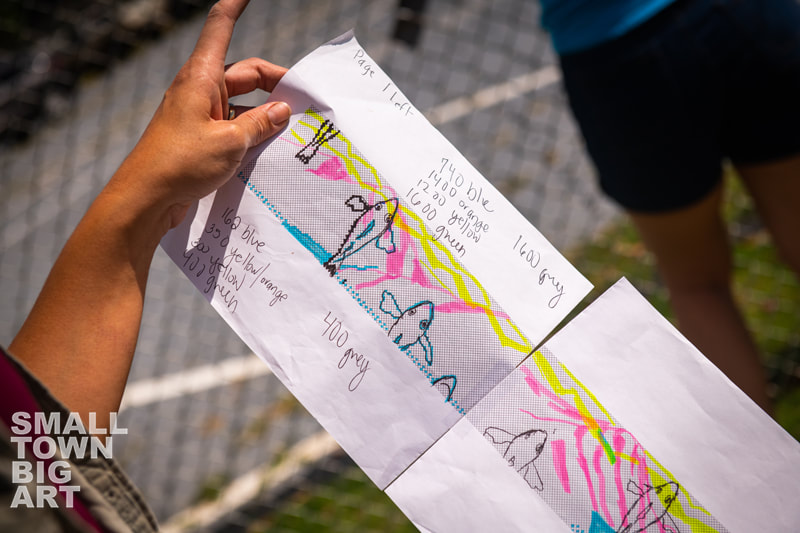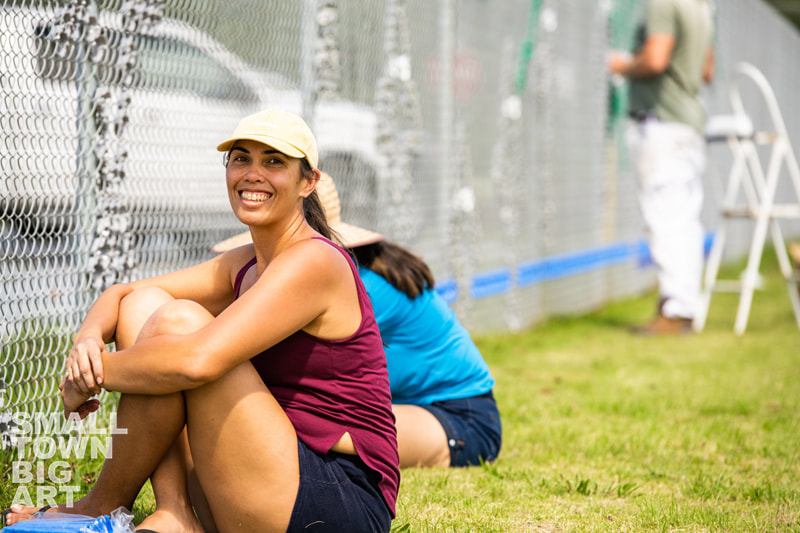In her writeup she noted that she “was inspired by both a moment in the middle of the pandemic where I was able to experience visually seeing a thriving amount of 'O'opu in ʻĪao valley and was also inspired by the community members who have been advocating for the Mauka to Makai access for the circle of the endemic and indigenous fish.”
Dennis Kawaharada's Hawaiian Fishing Traditions memorializes the great fishers of Hawai‘i while expressing two socioeconomic concerns: the conservation of fish resources and the fair and generous distribution of the catch, citing "The fishing ‘aumakua Ku‘ula-kai and Hina-puku-i‘a and their son ‘Ai‘ai were known not just for fishing, but for propagating and conserving fish. ‘Ai‘ai punished the wanton fishing of ‘o‘opu and ‘opae in Wailau, Moloka‘i, by getting his parents to use their supernatural powers to take away the catch. The ali‘i of Hawai‘i used kapu to prevent the people from overfishing an area or from fishing during spawning season. Hau tree branches indicated a kapu against shore fishing along a stretch of beach."
An important cultural resource to Native Hawaiians, 'O'opu were used for both food and religious ceremonies (within limits of kapu). There are five species in Hawai‘i’s streams, with four found nowhere else on Earth. All five are amphidromous— that is, they spend their adult lives in freshwater, where they spawn and lay eggs in the streambeds. When they hatch, the larvae are washed out to sea, where they drift for months. Only as fingerlings, and after a dramatic metamorphosis, do they begin their trip back upstream. It is this migration journey makai (toward the sea) to mauka (toward the mountains) that makes 'O'opu even more incredible, as they are collectively known for their ability to climb using their strong suction cup mouths to cling to rocks and move upward. Some species are even able to climb waterfalls at elevations over a thousand feet.
“You don’t always have time to stop and look at what’s going on beneath your feet,” shares Jaclynn, “even in the Valley (ʻĪao) you might think “let me just run in and take a dip” and then you leave. Maybe a lot of us have experienced a moment in nature during COVID where we’re able to stop and look at what’s around us: a flower, a beach, an 'O'opu. So this project isn’t just about me seeing something for the first time, it’s about not having or taking the time to look in the first place. Maybe this artwork can be a trigger to teach others about the things that have always been here. To stop, take notice and fully immerse yourself in the moment.”
During a recent conversation, ST*BA partner Sissy Lake-Farm of Hale Ho'ike'ike remarked, “I feel like the evolution of each individual public artwork project is such an important part of this program. The art evolves as the message evolves. The way the community engages gives light to what the piece becomes. And this one is exciting because of its unmistakable connectedness to Wailuku - with Jackie being from here, with Uncle (referring to acclaimed Wailuku artist Phil Sabado, who is Jackie’s father) and that whole piece, and then the 'O'opu. All of this will help educate others about Wailuku.”
Many conversations have already been spurred by this “Makai to Mauka” project, each ultimately geared towards a sense of mālama for our unique Wailuku resources. Our hope is that art projects like these can spur community dialogue about a sense of place; to continually create a space for greater learning about the people, places and stories of Wailuku; and to take the opportunity to stop, observe and acknowledge the precious details right in front of us.
You can see Jaclynn's piece now at the Wells Street temporary parking lot, which is being installed with "Put-in-cups" - a medium that we would love to see adopted at schools and other places looking to involve others in an accessible and environmentally-friendly art form. The piece will be completed in time for Earth Day 2021 (April 22) as a reminder to protect and preserve our native ecosystems. (Photos: Sean Hower)
Learn more at smalltownbig.org/sabadoeitel


 RSS Feed
RSS Feed